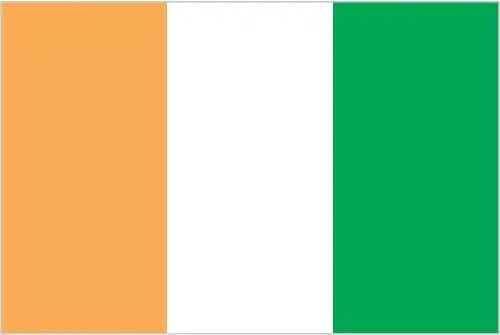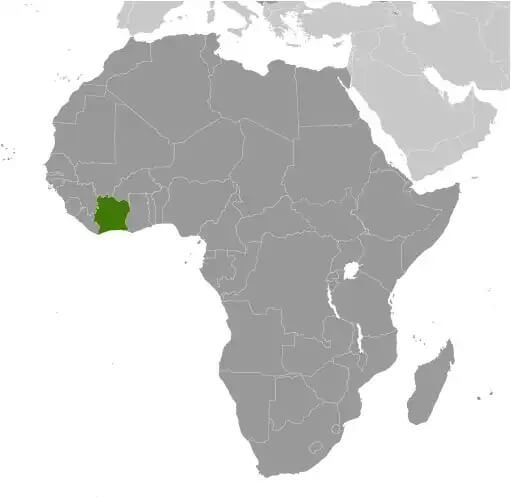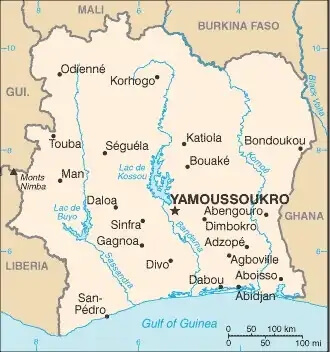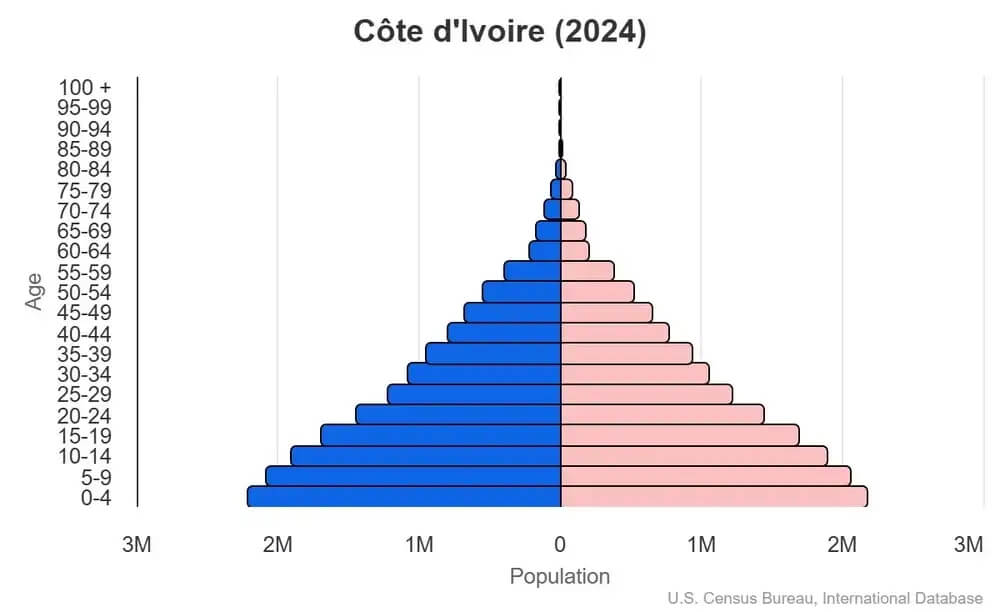World Book
Cote d'Ivoire
World Book Index
53


With a score of 53, the country is ranked 118th out of 158 countries in the World Book ranking. (more information)
Introduction
Close ties to France after independence in 1960, the development of cocoa production for export, and foreign investment have all made Cote d'Ivoire one of the most prosperous of the West African states. A series of coups and conflicts since the 1990s disrupted the country's political system, but stability returned with the 2021 elections.
Neighboring countries
Burkina Faso - Ghana - Guinea - Liberia - Mali
Geography
Area
total: 322,463 sq km
land: 318,003 sq km
water: 4,460 sq km
Climate
tropical along coast, semiarid in far north; three seasons - warm and dry (November to March), hot and dry (March to May), hot and wet (June to October)
Natural resources
petroleum, natural gas, diamonds, manganese, iron ore, cobalt, bauxite, copper, gold, nickel, tantalum, silica sand, clay, cocoa beans, coffee, palm oil, hydropower
People and Society
Population
total: 29,981,758 (2024 est.)
Ethnic groups
Akan 38%, Voltaique or Gur 22%, Northern Mande 22%, Kru 9.1%, Southern Mande 8.6%, other 0.3% (2021 est.)
Languages
French (official), 60 native dialects of which Dioula is the most widely spoken
Religions
Muslim 42.9%, Catholic 17.2%, Evangelical 11.8%, Methodist 1.7%, other Christian 3.2%, animist 3.6%, other religion 0.5%, none 19.1% (2014 est.)
Population growth rate
2.13% (2024 est.)
Government
Government type
presidential republic
Capital
name: Yamoussoukro (legislative capital), Abidjan (administrative and economic capital); note - the US Embassy is in Abidjan
Executive branch
chief of state: President Alassane Dramane OUATTARA (since 4 December 2010)
head of government: Prime Minister Robert BREUGRE MAMBE (since 17 October 2023)
Diplomatic representation in the US
chief of mission: Ambassador Ibrahima TOURE (since 13 January 2022)
Diplomatic representation from the US
chief of mission: Ambassador Jessica Davis BA (since 2 March 2023)
Economy
Economic overview
one of West Africa’s most influential, stable, and rapidly developing economies; poverty declines in urban but increases in rural areas; strong construction sector and increasingly diverse economic portfolio; increasing but manageable public debt; large labor force in agriculture
Real GDP (purchasing power parity)
$215.018 billion (2024 est.)
$202.943 billion (2023 est.)
$190.645 billion (2022 est.)
Real GDP per capita
$6,700 (2024 est.)
$6,500 (2023 est.)
$6,300 (2022 est.)
Exports
$17.211 billion (2022 est.)
$16.23 billion (2021 est.)
$13.232 billion (2020 est.)
Exports - partners
Switzerland 17%, Netherlands 9%, Mali 7%, USA 5%, Malaysia 4% (2023)
Exports - commodities
gold, cocoa beans, rubber, refined petroleum, coconuts/brazil nuts/cashews (2023)
Imports
$19.948 billion (2022 est.)
$16.191 billion (2021 est.)
$12.66 billion (2020 est.)
Imports - partners
China 16%, Nigeria 12%, France 6%, India 5%, USA 4% (2023)
Imports - commodities
crude petroleum, ships, refined petroleum, fish, rice (2023)
Human Development Index
The country's Human Development Index (HDI) is 0.582, ranking it 157th out of 193 countries tested. (more information)
World Happiness Report
The World Happiness Report ranked the country 109th out of 158 countries tested with a score of 4.881. (more information)



